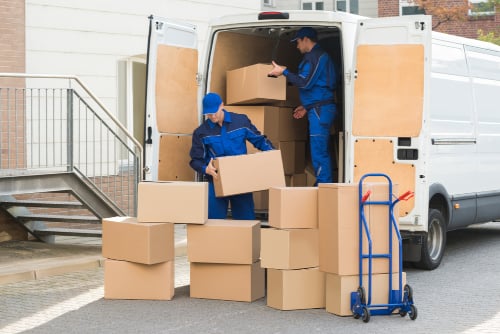
Relocation will be an important part of your expatriation project to the Philippines. Here are some guidelines to help you.

If you have decided to relocate to the Philippines, take enough time to choose a reliable and trustworthy freight forwarder and international removal company, This is an important step not to be taken lightly.
Set up an appointment with a relocation counselor for an in-house estimate. Make a list of all the objects that require special care (glass, mirror, piece of art, special packaging, etc.) Specify to the mover what you will do yourself (dismantling furniture, packing dishes, etc.). To find a carrier or a mover, use the Internet, consult the yellow pages or get a free quote and find your mover in the Philippines now.
Regarding the estimate, several key points are to be considered, such as:
Origin address ' where removers will pack and load your belongings
Destination address in the Philippines – where removers will unload your belongings
Volume or weight of your stuff
Types of transportation (by air, train, truck, ship)
Nature of the services ' terms and conditions ' insurance damage
Prices and payment plans
Usually, removal companies unload your belongings directly at the destination address. However, some removal companies unload your belongings in warehouses, and you have to pick them up yourself afterward, implying additional costs. Check your moving contract carefully.
Making an inventory before moving to the Philippines
Make an exhaustive inventory of your belongings so as to establish a value statement. The value statement is an important document that sets the compensation amount you could receive in case of loss or damage to your belongings.
Complete the declaration of value yourself by stating the overall value of your property and the value of certain particular precious items. Read carefully the terms and conditions of your contract to find out more about the transportation and handling of precious objects. This statement is particularly important because, without it, an estimate cannot be established, which will obviously affect your relocation and your organization.
Getting damage insurance when relocating to the Philippines
Accordingly, damage insurance will be proposed by the carrier. This insurance automatically covers non-predictable damage associated with the transportation of your belongings up to the value indicated in the declaration of value. The cost of the insurance depends on the overall value of your belongings. The removal company must issue a certificate of insurance in any case.
Signing the waybill when relocating to the Philippines
Finally, you must sign the waybill (a paper prepared by the carrier of your shipment of goods that contains details of the shipment, route, and charges) before loading and after delivery of your belongings. The waybill is a document that specifies the terms and conditions of the contract, the mode of transportation, the volume or weight carried by the removal company, and the name and address of both the customer and the carrier. By signing the waybill, you definitely agree to these terms and conditions and give permission to the removal company to go ahead.
Regarding removal payment plans, a deposit is usually paid before loading, and the balance must be paid upon delivery. A payment plan must be arranged with the removal company in any case.
Important:
In general, carriers handle custom paperwork for you (customs clearance, etc.) For more security, opt for a carrier affiliated with the FIDI (International Federation of International Movers).
Cost of relocating your items to the Philippines
Expats who take the exciting move to the Philippines will normally ship their belongings. This is not compulsory, and it is an option to start from scratch here.
If you do decide to use a removal company through freight forwarding (sea or air), the cost is relative to the weight, turnaround time (which may take 6 weeks at least) and the logistics- distance from point A to point B. What is for sure is that if the price is too good to be true, be cautious. Shop around and do not just go for the cheapest option, as your home items are at stake!
Customs regulations in the Philippines
Note that you, your customs broker, or a person duly empowered to act as an agent must be present for customs clearance (except if you're a foreign diplomat, you're exempt), and your shipment cannot arrive in the country prior to your visa for the Philippines being approved. Your belongings should arrive within 60 days of your arrival in the Philippines, and the Bureau of Customs (BOC) has the right to subject these to inspection (except for goods belonging to foreign diplomats).
Tax and duty exemption for used household goods and personal effects varies depending on the visa you have. Foreigners with one of the following visas are entitled to the full exemption of tax and duties:
foreign diplomats, UN and government personnel;
permanent residence 13-g visa;
work visa 9-g;
investor's visa;
non-immigrant visa 47-a2; and
retiree visa.
You must also be ready with the following documents:
original passport;
bill of lading/air waybill;
comprehensive inventory list in English (each item should be labeled 'Used');
work permit/or certificate from an attorney; and
visa.
Regulated imports in the Philippines
The following products are submitted to certain regulations on being imported to the Philippines:
food products (processed or unprocessed);
plant products;
animal products;
aquatic products;
drugs and chemical products;
used motor vehicles;
electrical appliances;
telecommunication equipment;
tobacco products; and
mineral products.
Please note that this is a non-exhaustive list. For more information, please refer to the Philippine Bureau of Customs website.
Restricted imports in the Philippines
The following products are submitted to restrictions on importation into the Philippines:
dynamite, gunpowder, ammunitions and other explosives, firearms and weapons of war, or parts thereof;
roulette wheels, gambling outfits, loaded dice, marked cards, machines, apparatus or mechanical devices used in gambling or the distribution of money, cigars, cigarettes or other goods when such distribution is dependent on chance, including jackpot and pinball machines or similar contrivances, or parts thereof;
lottery and sweepstakes tickets, except advertisements thereof and lists of drawings therein;
marijuana, opium, poppies, coca leaves, heroin or other narcotics or synthetic drugs which are or may hereafter be declared habit forming by the President of the Philippines, or any compound, manufactured salt, derivative, or preparation thereof, except when imported by the government of the Philippines or any person duly authorized by the Dangerous Drugs Board, for medicinal purposes;
opium pipes or parts thereof, of whatever material;
any other goods whose importation and exportation are restricted.
Prohibited imports in the Philippines
The following products cannot be imported into the Philippines:
written or printed goods in any form containing any matter advocating or inciting treason, rebellion, insurrection, sedition against the government of the Philippines, or forcible resistance to any law of the Philippines, or written or printed goods containing any threat to take the life of, or inflict bodily harm upon any person in the Philippines;
goods, instruments, drugs and substances designed, intended or adapted for producing unlawful abortion, or any printed matter which advertises, describes or gives direct or indirect information where, how or by whom unlawful abortion is committed;
written or printed goods, negatives or cinematographic films, photographs, engravings, lithographs, objects, paintings, drawings or other representation of an obscene or immoral character;
any goods manufactured in whole or in part of gold, silver or other precious metals or alloys and the stamp, brand or mark does not indicate the actual fineness of quality of the metals or alloys;
any adulterated or misbranded food or goods for human consumption or any adulterated or misbranded drug in violation of relevant laws and regulations;
infringing goods as defined under the Intellectual Property Code and related laws; and
all other goods or parts thereof, which importation and exportation are explicitly prohibited by law or rules and regulations issued by the competent authority.
Useful links:
FEDEMAC - Federation of European Movers
We do our best to provide accurate and up to date information. However, if you have noticed any inaccuracies in this article, please let us know in the comments section below.








